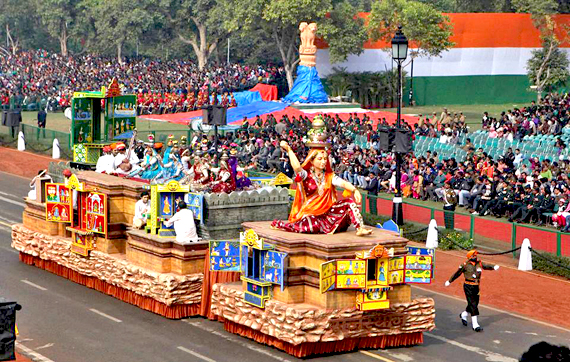
New Delhi, Jan 26: Multi-hued images of India's rich cultural heritage, its achievements in diverse fields and military prowess were on majestic display at the magnificent Rajpath, the ceremonial boulevard, on Sunday as the nation celebrated its 65th Republic Day amid tight security.
Marching down from the seat of power at Raisina Hills to Red Fort, the parade showcased India's 'unity in diversity' and defence capability as thousands of spectators along the 8-km-long route cheered the contingents and the mechanized columns.
The well-turned out and synchronized military and police contingents led by General Officer Commanding (Delhi), Lt General Subroto Mitra, marched proudly to the lilting tunes of bands through Rajpath where President and supreme commander of the Armed Forces Pranab Mukherjee took the salute.
The march past was watched by Japanese Prime Minister Shinzo Abe, the chief guest of the Republic Day celebration, Vice President Hamid Ansari, Prime Minister Manmohan Singh, UPA chairperson Sonia Gandhi and the country's top political and military brass, besides the diplomatic community.
Braving the winter chill, a large number of enthusiastic people came to witness the parade that culminated at the historic Mughal monument of Red Fort.
Minutes before the parade began, the Prime Minister, defence minister A K Antony and chiefs of army, navy and air force laid wreaths at 'Amar Jawan Jyoti', the war memorial at the India Gate where an eternal flame burns in memory of those who laid down their lives defending the frontiers of the nation.
A massive ground-to-air security apparatus was put in place in the national capital to ensure an incident-free Republic Day celebrations. Snipers of National Security Guard were deployed at all high-rises along the parade route.
Around 25,000 security personnel were deployed across the city while the commandos of the Indo-Tibetan Border Police and Delhi Police kept vigil at important locations.
The unfurling of the tricolour by the President and playing of the national anthem were followed by a customary 21-gun salute. Among others who witnessed the parade at Rajpath was Delhi chief minister Arvind Kejriwal.





Comments
Add new comment